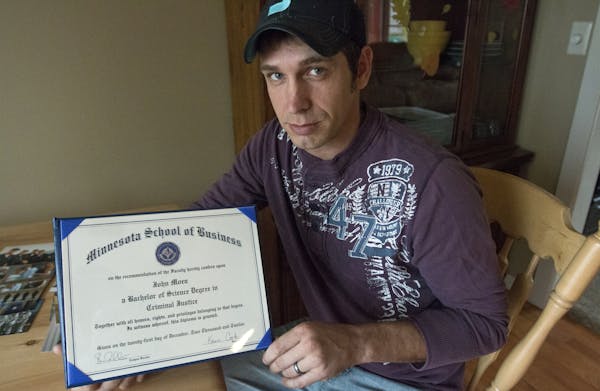The Department of Defense has placed Globe University and its sister, the Minnesota School of Business, on probation, meaning the schools can no longer accept some federal military educational benefits.
Current students can remain at the schools, but the restriction, made public this week, is the latest bad news to hit the two Minnesota-based for-profit schools. Attorney General Lori Swanson is suing them for deceptive marketing practices and fraud.
Lt. Cmdr. Nate Christensen, a Defense Department spokesman, said the Pentagon does not disclose information regarding any pending enforcement action for specific schools participating in its Voluntary Education Partnership Memorandum of Understanding.
But the program's website lists both Globe and Minnesota School of Business as being on probationary status, meaning the schools are not in compliance with the program, either because of a loss of accreditation, or because the Pentagon is investigating a complaint about the school.
Of 96 schools in Minnesota participating in the Department of Defense program, Globe and MSB are the only schools on probation, according to the website. The program monitors compliance of federal military tuition assistance programs.
The Pentagon spokesman would not talk about specifics, but the schools claim the restrictions don't affect the G.I. Bill. New active duty service students and drilling members of the National Guard and Reserve cannot receive tuition assistance while the Pentagon probe continues, the schools said.
The schools said the Pentagon's move was a direct reaction to the Minnesota attorney general's lawsuit, which it called "an unnecessary enforcement action," although the move may have come from additional complaints as well.
"While there should be an assumption of innocence until any wrongdoing is proven, unfortunately the Department of Defense has chosen to respond to the Attorney General's lawsuit in this way," the schools said in a statement.
While in a probation status, a school is not authorized to sign new students using various federal military tuition assistance programs, Christensen said.
"While in a probationary status and with a view to minimizing harm to students, an institution will be permitted to 'teach-out.' This means that current students receiving Department of Defense tuition assistance will be permitted to complete courses already in progress and enroll in new courses deemed to be part of that student's established academic program," Christensen said.
Suit claims deception
The action comes following Swanson's lawsuit, which accuses the two schools of misleading criminal-justice students about their job prospects after graduation and deceiving them about the ability to transfer credits to other colleges or universities. The attorney general also accused the schools of using high-pressure sales tactics to lure students to its programs.
Many of the students in Swanson's lawsuit are using the G.I. Bill and other federal military assistance programs to finance their education. The schools rely heavily on military tuition assistance programs. As much as 20 percent of their students have military connections, the schools have said in the past.
The Star Tribune recently documented cases of vets nearly exhausting their G.I. Bill benefits on the schools' criminal justice programs only to discover the schools did not meet the accreditation standards for state licensing.
The accusations in the lawsuit place the schools in apparent violation of several provisions of the agreement they signed with the Defense Department.
The schools said they have notified students, prospective students, and employees of the sanctions. The schools said they have offered a tuition adjustment to affected students.
"We value the hard work of our students and employees and will do whatever we can to protect their degrees, reputations and jobs," the schools said in a statement. "If the Attorney General continues to deny our requests to work with her to address the allegations she's made regarding our colleges, she will be hurting not only veterans, but thousands of Minnesota citizens who are students in our degree programs, employees of our colleges and graduates thriving in our state's workforce."
A spokesman for the attorney general said the office is continuing to review new information to determine the full scope of the possible transgressions and pointed out the schools have been accused of similar practices since the 1980s.
"If the school is telling you it's hamstrung from ending its deceptive practices without the help of a regulatory agency, that's troubling," said Swanson spokesman Ben Wogsland.
Mark Brunswick • 612-673-4434

In Grand Rapids, Itasca Pride is planning its first event, but there is already pushback
One person shot at YMCA in Coon Rapids

BCA says man pointed pistol-style BB gun at officers before he was shot in Woodbury

Former diversity worker sues University of Minnesota after firing over swastika photo

